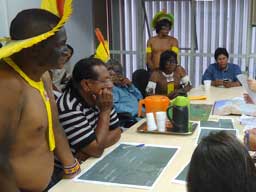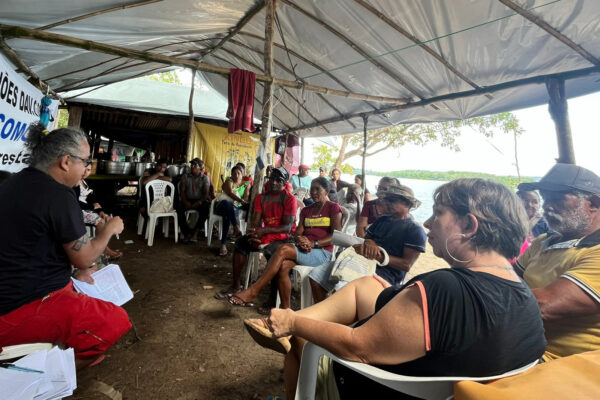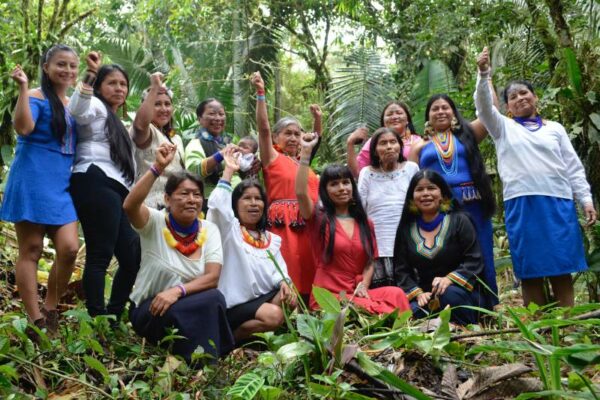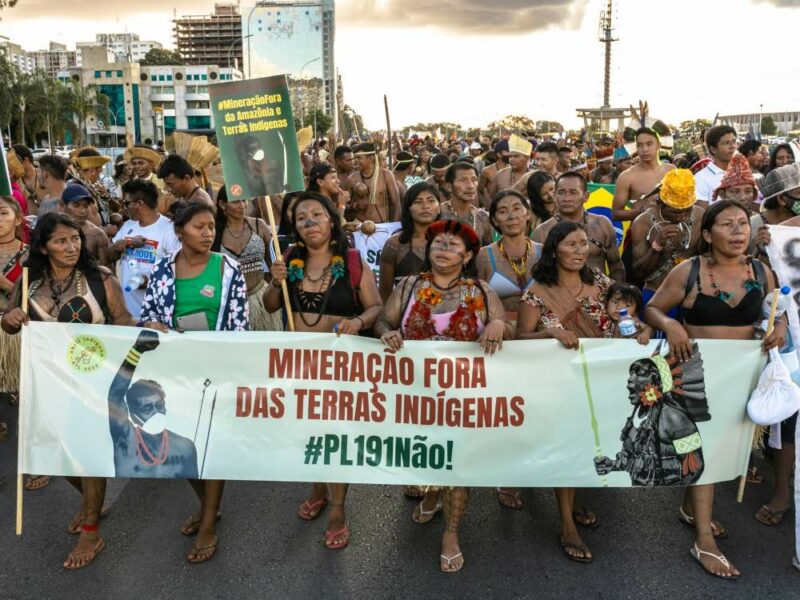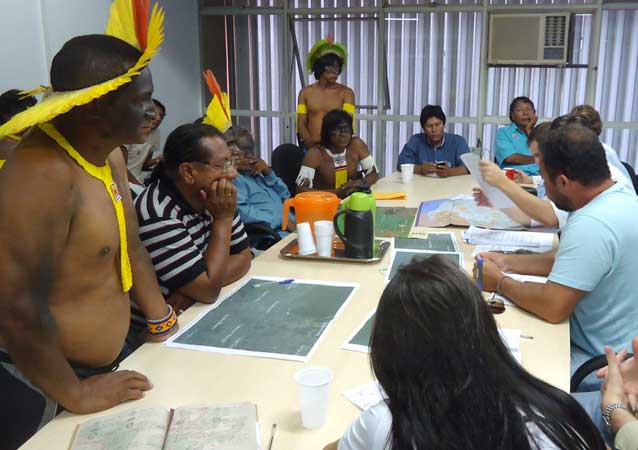
On March 20th fourteen Kayapo leaders traveled to the headquarters of Brazil’s indigenous agency FUNAI to discuss the demarcation and regularization of ancestral indigenous lands known as Kapot Nhinore, and to denounce the serious conflicts taking place between Kayapo and Juruna peoples and those who have occupied their traditional lands.
“I don’t want to go back home only with words, I want to go back home with a solution,” said Daniel Apinama, one of the Kayapo leaders on the delegation. “The area was traditionally always ours, but now there are all sorts of invasions by farmers, fishermen, and businessman building hotels. If there is no adequate response, there will be conflict.”
Endeavors to demarcate Kapot Nhinore started thirteen years ago but the process has been foiled by unfulfilled promises from FUNAI, leading to a protracted struggle. Terry Turner, an anthropologist that has worked alongside the Kayapo for over 45 years, participated in a technical study on the process of demarcation and delivered his working group’s full analysis in 2003. However, FUNAI has claimed that there were documents missing, indefinitely stalling the demarcation process.
“When I submitted the brief for the demarcation of Kapotnhinore on behalf of the official FUNAI Working Group nine years ago, it was accepted by the then President of FUNAI, Dr. Mercio Gomes. There was absolutely no mention of missing documents,” Terry Turner affirmed. “Soon afterward, when Márcio Meira took over the Presidency of FUNAI, one of his first acts was to call Kayapo leaders Raoni and Megaron Txukarramãe to Brasilia and promise them that he would carry out the demarcation of Kapot Nhinore following the recommendations I had submitted. FUNAI, however, failed to keep its promise, and over the ten years since has allowed a continual stream of settler invasions into the area. These are the people who are now threatening violence against the Indians.”
At last week’s meetings, FUNAI appeared willing to help the Kayapo and Juruna, but they made it clear that the decision to demarcate is not theirs. The President of FUNAI must answer to the Ministry of Justice that has to sign the decision, followed by the final approval of President Dilma Rousseff.. Maria Auxiliadora, the Director of Land Protection of FUNAI told the indigenous delegation that this struggle will last at least 10 years. To the leaders this amounts to an indefinite delay, shattering hope for a prompt resolution.
Ms. Auxiliadora also warned the leaders that they should avoid open conflict with the illegal settlers, as it would not further their cause. Yet violence has already erupted at Kapot Nhinore, with the destruction of a FUNAI vehicle by hired thugs and the police beating of a Juruna man. The fact that the police, whose role is to stem violent conflict, have been directly implicated in the repression of the indigenous protestors begs the question: How can those whose lives and rights are being threatened remain peaceful?
“It is shameful for FUNAI now to warn the Kayapo that they will harm their own cause if they use force to resist the violent assaults of the invaders whom FUNAI itself has failed to fulfill its responsibility to control,” said Mr. Turner. “It is even more unacceptable for FUNAI to tell the Indians that they must now wait another ten years for anything to be done about the situation its own decade of inaction has created.”
“We don’t invade Brasilia or São Paulo to make a village,” asserted the leader Bedjai Txucarramae. “We respect you, and so we also ask for your respect. If this issue is not solved we will start to attack [the settlers] and this will generate more conflicts for you. If we die because of it will be even better.”
During days of meetings with FUNAI, as well as with the environmental agency IBAMA and Brazil’s Federal Police where the indigenous delegation raised serious concerns into the worsening environmental impacts and security situation at Kapot Nhinore, there was little resolution. Instead, the delegation faced new challenges in Brazil’s Congress as official guidelines for indigenous land demarcation came under attack.
Known as the PEC 215, this amendment makes it considerably more difficult to gain final approval to designate new indigenous territories and conservation units in Brazil by passing the decision from the executive to the legislative branch of government, where such decisions will likely face long delays and reversals. In the increasingly hostile climate of Brazil’s Congress, where a powerful agro-business driven “ruralist” voting bloc is successfully slashing the country’s Forest Code and other key environmental safeguards, any attempt to create new protected areas will face withering resistance.
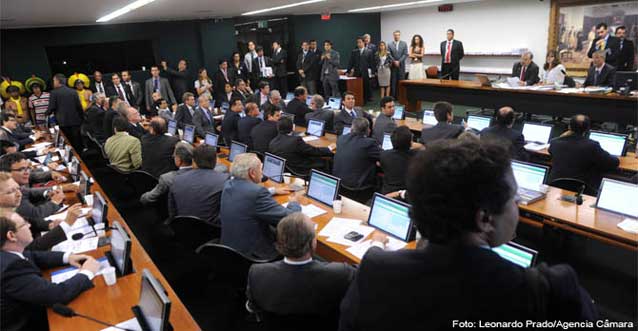
As voting commenced on the PEC amendment, the indigenous delegation rushed across Brasilia to place last-minute pressure on the congressional deputies. They arrived in the chamber in a show of strength, dressed in full regalia, chanting a warrior song. The room was quickly filled with the sound of the spirits from the forest. However, all but two deputies on the room completely ignored their presence and quickly approved the amendment, celebrating in front of the Kayapo as if they were not even there. From the middle of the chaos in the room, a voice arose saying, “we did lose a battle, but we did not lose this war”. And there will be a war, as the Kayapo promise to continue with their steadfast occupation of Kapot Nhinore, until the land is finally demarcated.
When the delegation later returned to FUNAI, the agency offered an “initial” plan, after 13 years of waiting, to re-start the demarcation process. Together FUNAI, IBAMA, and Federal Police promised to act together to help solve the conflicts, and to make sure the process of demarcation will move forward in the best way possible. In the end, these were only more words, but they did offer a little hope.
Meanwhile, Kayapo warriors maintain a non-violent occupation camp at Kapot Nhinore. Since the conflict began in early February, Amazon Watch has been supporting the Kayapo and Juruna in their battle to defend Kapot Nhinore. Thanks to your support, we’ve sent over 22,000 petition signatures to FUNAI’s President and nearly $10,000 to the Instituto Raoni to support the Kayapo resistance. We are committed to supporting Chief Raoni, the Kayapo, and the Juruna people in defense of their rights and territory.
If you haven’t already, please sign the petition and/or make a donation to the Xingu Urgent Action Fund.


